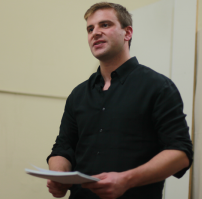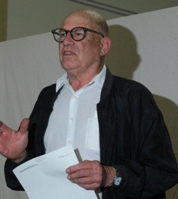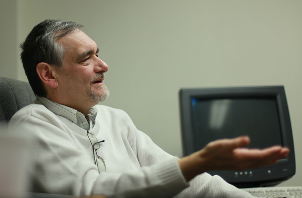IHR Holiday Get-Together: An Enjoyable and Informative Event
News from the Institute for Historical Review
This year’s Christmas-Holiday meeting on Saturday, Dec. 11, 2010, brought together 30 friends and supporters of the IHR, many of them younger men and women, for an enjoyable evening of fellowship and interesting talks at the Institute’s offices in southern California.
Attendees contributed more than $500 in donations, and one donated a color office printer. Although this was primarily a social event, several speakers gave substantive talks.
Director Mark Weber expressed appreciation for the generous help of local supporters during the past year, including volunteer work and financial backing, and thanked twelve of them by name.
This past year has been busy and productive, said Weber, who reviewed the Institute’s impact through dozens of broadcast interviews and guest appearances, online outreach, routine distribution of books, discs and flyers, and more. Since last December, he went on, the IHR has held many more meetings than during any other one-year period. This has been possible because the Institute is one of the very few associations of its kind in the US with an actual office and space for meetings. The IHR has also built a local support network that is larger and more active than ever.
|
Michael Polignano, a writer who was visiting from northern California, spoke about Counter Currents Publishing, a venture that he and Gregory Johnson recently launched. In another talk, a local friend of the IHR said that watching television is largely a waste of time. Ending television viewing, he said in his well-delivered and well-received address, will make your life healthier and more productive. In a 20-minute talk, Mark Weber tackled a question that people ask again and again, “What can I do?” He made both general points and a number of specific suggestions, and stressed the importance of being active. “One deed is worth a hundred good thoughts,” he said. “One real act is worth a hundred good intentions.” Each person has his own strengths and abilities, he went on, and should determine for himself how he can be most effective and productive. He mentioned distributing flyers, on-line outreach and, not least, raising and donating money. He urged activists to cultivate ties with men and women who hold similar views, through networking and forming local groups. In an increasingly “virtual world,” he said, there’s no substitute for one-on-one human relations. Weber cautioned against disappointment. “Be patient,” he said, “This is a long-term struggle.” Be the kind of person you want others to be, he added. He quoted Tolstoy: “Everyone wants to change the world. No one wants to change himself.” Weber stressed the importance of acting, speaking and writing responsibly. “Never be rude or insulting.” The sacrifices we make in this struggle are minor, even trivial, compared to those made by our forefathers, said Weber, who cited examples of exemplary courage and self-sacrifice by outstanding figures from American and world history. Following up on Weber’s talk, three local activists spoke of their own experiences, and made good points about how to be more effective and self-motivated. |
|


